🎗️Lonny's War Update- October 713, 2023 - September 18, 2025 🎗️
🎗️Day 713 that 48 of our hostages are still in Hamas captivity🎗️
Aunt of slain hostage angrily confronts MK who dismissed recovery of bodies from Gaza
Hannah Cohen, aunt of murdered hostage Inbar Haiman, confronts Knesset Finance Committee chair MK Hanoch Milwidsky during a committee session, saying, “A man like you does not deserve to sit in the Knesset.”
Her broadside comes in response to comments made yesterday by the Likud MK about returning murdered hostages, in which he said that Israel shouldn’t be turned “upside down over corpses. I don’t think we should endanger soldiers for corpses or overturn the country.”
The comments drew outrage from hostage families, particularly those of the 26 hostages confirmed to be dead by the IDF, whose bodies are still being held by terror groups in Gaza. During the hearing, Milwidsky offers an apology for his use of the word “corpses,” which he says was insensitive.
“You abandoned [Inbar], and you need to pay the price for that abandonment,” Cohen tells him.
Cohen claims that Finance Minister Bezalel Smotrich previously told her that the dead hostages would not be returned through a deal but through military action.
“Now you say that murdered hostages also won’t be returned via military action,” she says to Milwidsky. “So maybe all of you should get together and decide how we return murdered hostages.”
“Tomorrow you’ll come and tell me that my girl is worth half a camel,” Cohen continues, excoriating the chair for even discussing the prices of hostages. “If you make Inbar nothing, you will have to face me. Remember that.”
Listing other hostages whose bodies remain in Gaza, she accuses Milwidsky, and other lawmakers of “killing them a second time.”
“You are a man without morals,” she says to Milwidsky, who is currently under police investigation for rape.
“I’m ashamed of you. Maybe look for another job,” she adds before leaving the room.
After Cohen exits, Milwidsky resumes the session, saying: “OK, where were we?” link Hannah Cohen is absolutely right. People like Milwidsky don't belong in the Knesset or in any public office where they are supposed to represent and act on behalf of the public. He, like too many of his colleagues are nothing but bottom dwellers. They have no connection to the pains of the people and take no responsibility for their roles that there are even hostages to begin with. It is due to their neglect and abandonment that 1200 people were killed and 251 hostages taken on their watch, yet they shirk all responsibility for that day and certainly for every day that has come after it, now 713 days what 48 hostages are rotting in Gaza. They don't even try to understand the pain and suffering of all of the hostage families, living and dead hostages. They were killed and taken on their watch. The families of the dead and those who were killed during their captivity have not had any opportunity to mourn their loved ones because they have spent the last 713 days and counting trying to get this miserable government of petty and irresponsible politicians to act and bring home their loved ones for burial, for them to begin to heal, for all of us to begin to heal. Unfortunately, Milwidsky is not the only one who doesn't count the dead hostages or see and feel the need to bring them home. Netanyahu on a number of occasions has only referred to the 20-22 living hostages and Trump has also on multiple occasions referred to the living hostages alone. Trump has absolutely no understanding of the importance to bring the dead back home. For him, they are dead and where their bodies are makes no difference to him. He and Netanyahu's overt statements talking only of the living hostages has made it acceptable and normal by these other failed politicians to do the same. The only thing that Milwidsky said right is that it is wrong for us to endanger soldiers to bring home any of the hostages. The only way we will ever get all of our hostages home is through a deal, not through military might and pressure. We know that military pressure kills the hostages. The war needs to end with a deal that will bring home all of the hostages, all 48, living and dead, so that the nation can begin to heal and rebuild. And part of that healing and rebuilding is elections to get rid of the people who are still in power and have refused any responsibility for bringing us to October 7. They should have been the ones to resign in bulk on October 8 but they are not leaders, they are self interested party hacks who care about themselves before anyone else. They need to make the deal, bring home the hostages, end the war and all be replaced by elections by people who are worthy of leading us because they certainly are not.
**There is nothing more important than getting them home! NOTHING!**
“I’ve never met them,But I miss them. I’ve never met them,but I think of them every second. I’ve never met them,but they are my family. BRING THEM HOME NOW!!!”
Red Alerts - Missile, Rocket, Drone (UAV - unmanned aerial vehicles), and Terror Attacks and Death Announcements
*2 men in their 60s at a terrorist attack at the Allenby Bridge Crossing, which serves as a border crossing mostly for Palestinians between Israel and Jordan. 20 wounded. One terrorist killed, the army is searching the area to determine if there was more than one terrorist involved.
Allenby attacker stabbed victims after gun jammed, was driver of aid truck
The Jordanian assailant who carried out the deadly attack at Allenby Crossing between Jordan and the West Bank stabbed the two victims, according to a preliminary investigation by the military.
According to the initial probe, the assailant, who was driving a truck carrying humanitarian aid to the Gaza Strip, opened fire with a handgun at people at the crossing before the truck had been inspected by Israeli authorities.
The attacker then got out of the truck. After his gun apparently jammed, he began to stab the two victims. They were pronounced dead by medics at the scene.
Security guards at the crossing opened fire on the assailant, killing him.
Despite some reports in Hebrew media, the attacker is not believed to be a Jordanian soldier, Israeli defense officials say.
Dozens said killed in strikes as thousands flee Gaza City, but some vow to stay put
On IDF ground offensive’s second day, many Gazans say nowhere is safe; aid groups call for more pressure to stop operation; strikes said to cut internet, phone service
Displaced Palestinians flee Gaza City on foot and in vehicles, carrying their belongings along the coastal road toward southern Gaza, September 17, 2025. (AP/Abdel Kareem Hana)Dozens of Palestinians were said to have been killed in Israel Defense Force strikes across Gaza on Wednesday, as the military said Palestinians continued to flee Gaza City amid a major offensive in the Strip’s largest urban area.
At least 30 people were killed across the Strip in Israeli strikes, including 19 in Gaza City, local Hamas-run health authorities said. Israeli forces continued to bombard the city and other parts of the Strip overnight and into Wednesday, the second day of the IDF’s ground offensive in the area.
The casualty figures could not be independently verified and did not differentiate between fighters and civilians. Gazan health officials said they included several women and children.
The IDF said the air force struck some 50 targets in the Strip overnight, most of them in Gaza City, with some 140 targets hit over a 24-hour period. The military said the targets included tunnels, buildings used by terror groups, cells of operatives, and other infrastructure, but provided few additional details about the intensified operation.
According to reports, Israeli troops blew up remote-controlled explosive-laden unmanned vehicles in the northwest Tel al-Hawa neighborhood and in Gaza City’s south. During the war, the IDF has repurposed decommissioned APCs by packing them with explosives and attaching remote-control capabilities, in order to drive them into areas with Hamas infrastructure without risking the lives of troops.
Airstrikes and artillery fire were reported in several areas around the edges of the city.
On Wednesday, the military estimated that some 400,000 Palestinians had so far evacuated Gaza City. But it remains heavily populated despite a general evacuation order from the IDF, which has instructed civilians to move south to a humanitarian zone.
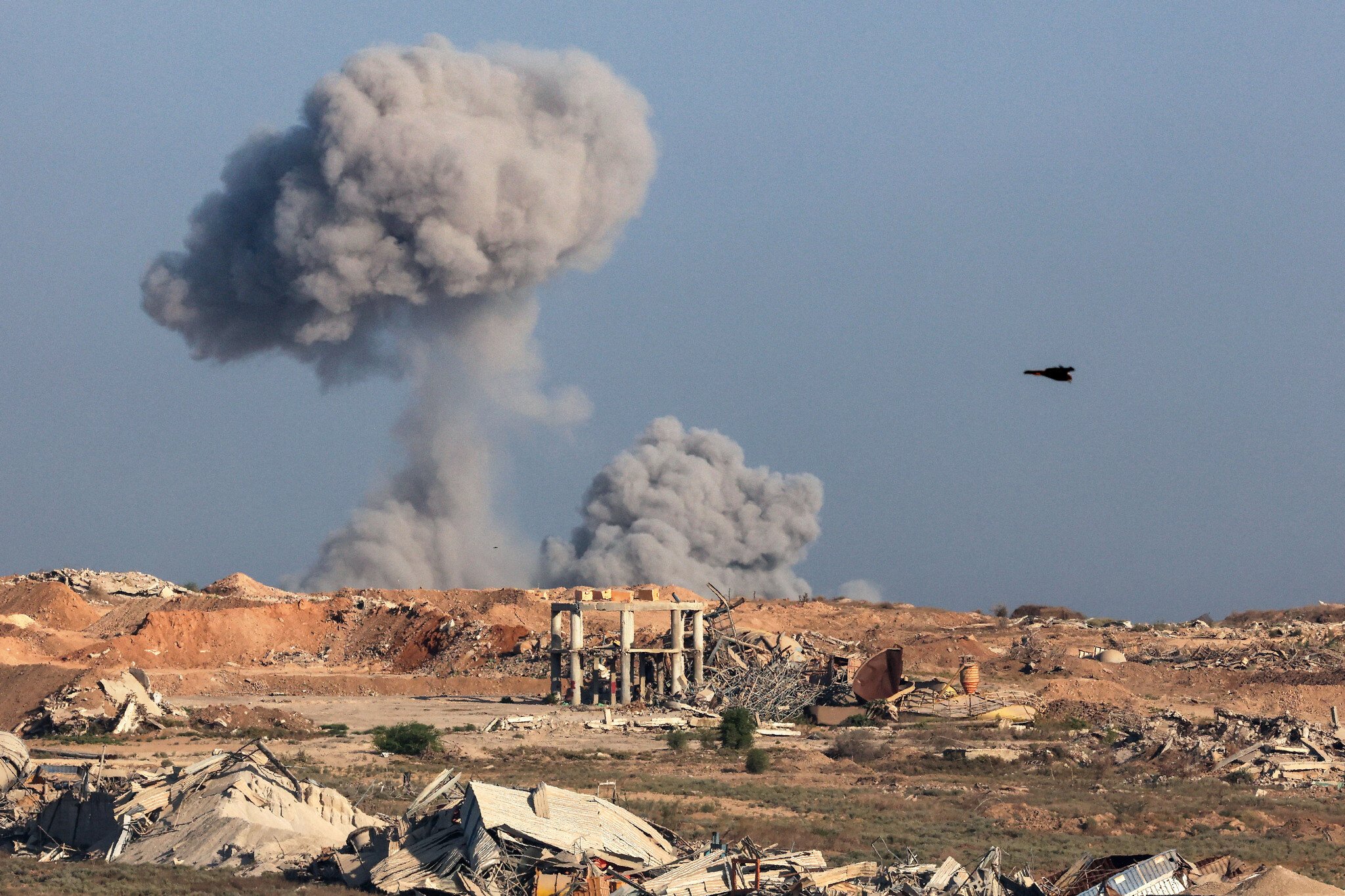 This picture, taken from a position at Israel’s border with the Gaza Strip, shows smoke billowing during an Israeli strike on September 17, 2025. (Jack GUEZ / AFP)
This picture, taken from a position at Israel’s border with the Gaza Strip, shows smoke billowing during an Israeli strike on September 17, 2025. (Jack GUEZ / AFP)Around 1 million Palestinians were estimated to be residing in the city before the IDF began preparations for its offensive there against Hamas. In recent days, the pace of evacuations has accelerated to tens of thousands of people a day, according to the army.
That increasing rate has led to overcrowding as people make their way out of the city. Until now, Gazans have only been able to leave via the Rashid coastal road, which has been inundated with foot and vehicle traffic as thousands move south to avoid the onslaught.
But on Wednesday, the military announced that it would facilitate a second evacuation route on Salah a-Din, the main north-south highway in Gaza, which will remain open until noon on Friday. Salah a-Din, a main inland artery running to central Gaza, was used as a principal evacuation route during an offensive in Gaza City in the first months of the war.
Displaced Palestinians headed southward a day after Israel unleashed a long-threatened ground assault on Gaza City, declaring ‘Gaza is burning’ as Palestinians there described the most intense bombardment they had faced in two years of war
Still, many Gazans say nowhere is safe and instead have vowed to stay in their homes despite the IDF’s order to evacuate.
“I won’t leave Gaza. There’s shelling here and there,” said Umm Ahmed Yunes, who is living in her partially destroyed home.
She additionally lamented the high cost of moving.
“Where would I find $1,000 or $2,000 for transport costs? Where would I buy a tent? There are no tents and prices are insane,” said the 44-year-old. “Death is cheaper and more merciful.”
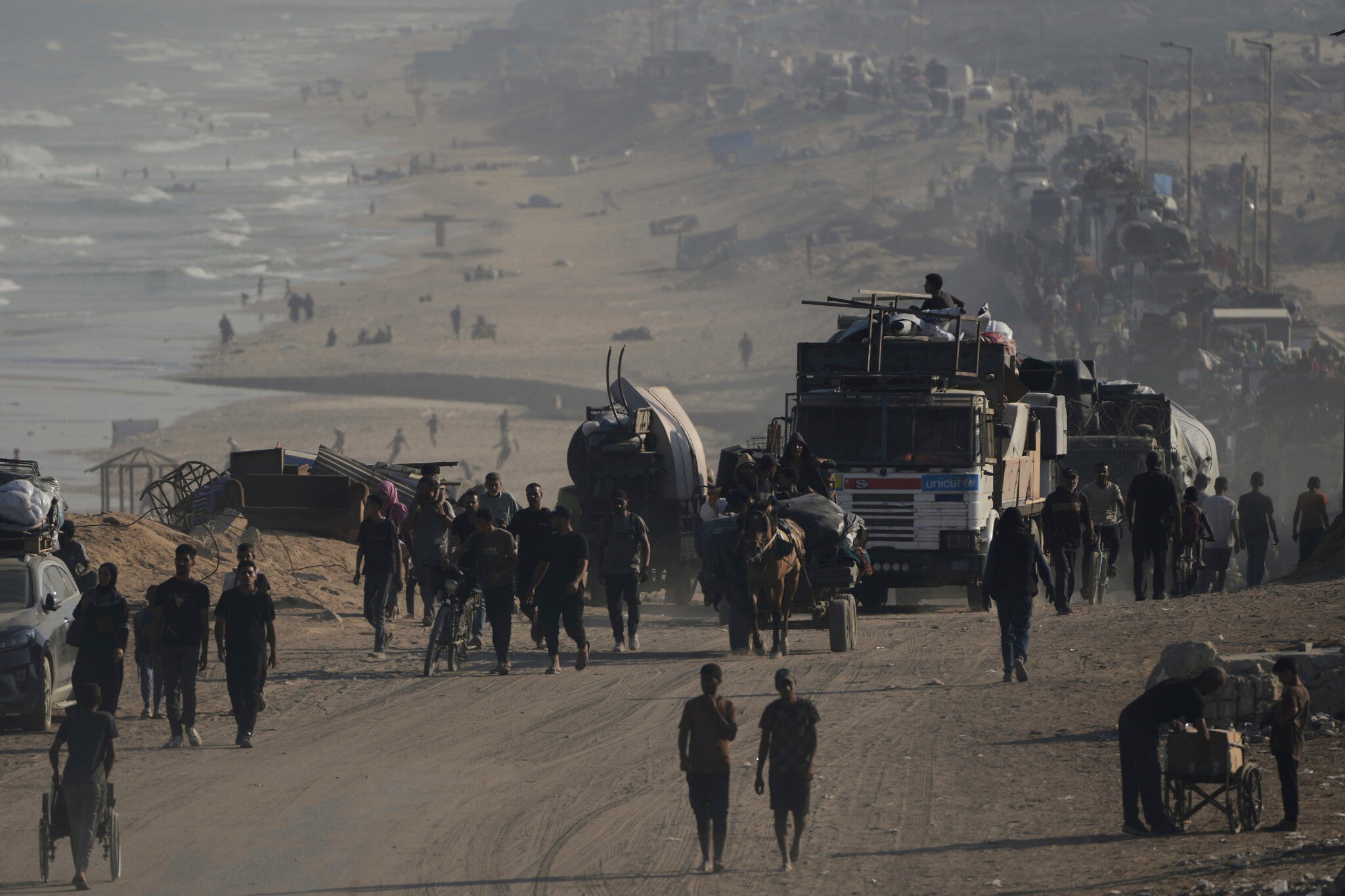 Displaced Palestinians flee Gaza City on foot and vehicles, carrying their belongings along the coastal road toward southern Gaza, Sept. 17, 2025. (AP Photo/Abdel Kareem Hana)
Displaced Palestinians flee Gaza City on foot and vehicles, carrying their belongings along the coastal road toward southern Gaza, Sept. 17, 2025. (AP Photo/Abdel Kareem Hana)Fatima Lubbad, a mother of four, said she had left Gaza City along with 10 relatives but felt the ordeal was unbearable.
“I wish we would all die together,” said the 36-year-old.
“Last night we slept in the street by the sea in Deir el-Balah — there was nowhere to put a tent… I cried all night as I looked at my children sleeping on the ground,” she said.
The military has estimated that, in addition to the approximately 600,000 civilians who have not yet evacuated, there are thousands of Hamas fighters in Gaza City. Additionally, a number of Israeli hostages are believed to be held in the city.
Terror groups in Gaza are holding 48 hostages, including 47 of the 251 abducted by Hamas-led terrorists during the October 7, 2023, attack that launched the war. Twenty hostages are believed to still be alive, while there are grave concerns for two others. The remainder are thought to be dead. Hamas is also holding the body of an IDF soldier killed in 2014.
As the ground and air operations in the city intensified, the Palestinian Telecommunications Regulatory Authority, based in the West Bank, said Israeli strikes on the main network lines in northern Gaza had collapsed internet and telephone services, cutting Gazans off from the outside world.
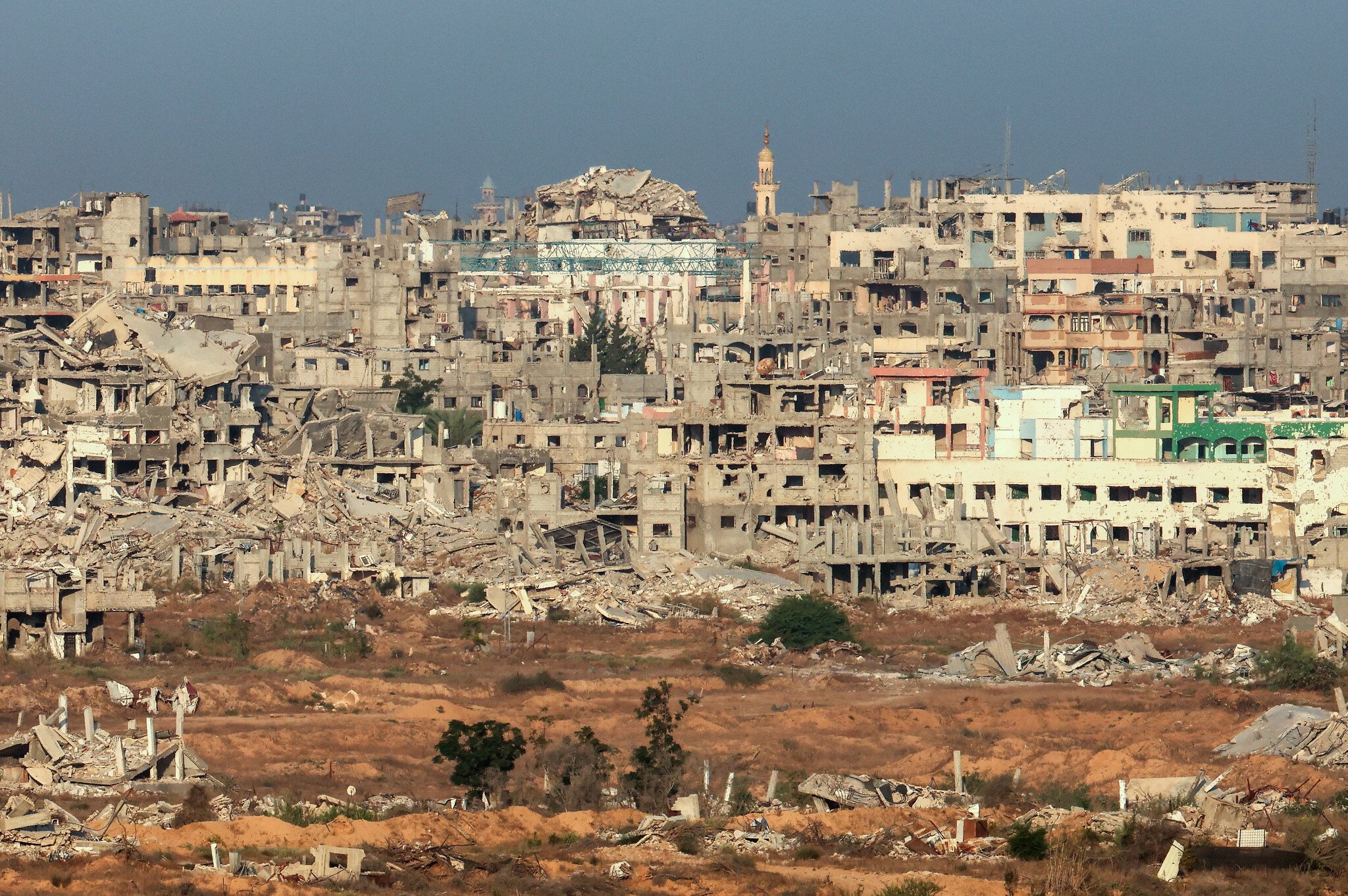 This picture taken from a position at Israel’s border with the Gaza Strip shows destroyed buildings in the Palestinian territory on September 17, 2025 (Jack GUEZ / AFP)
This picture taken from a position at Israel’s border with the Gaza Strip shows destroyed buildings in the Palestinian territory on September 17, 2025 (Jack GUEZ / AFP)Meanwhile, a coalition of leading aid groups on Wednesday urged the international community to take stronger measures to stop Israel’s offensive in the city.
“What we are witnessing in Gaza is not only an unprecedented humanitarian catastrophe, but what the UN Commission of Inquiry has now concluded is a genocide,” read the statement signed by leaders of over 20 aid organizations operating in Gaza, including the Norwegian Refugee Council, Anera, and Save the Children.
“States must use every available political, economic, and legal tool at their disposal to intervene,” the statement said. “Rhetoric and half measures are not enough. This moment demands decisive action.”
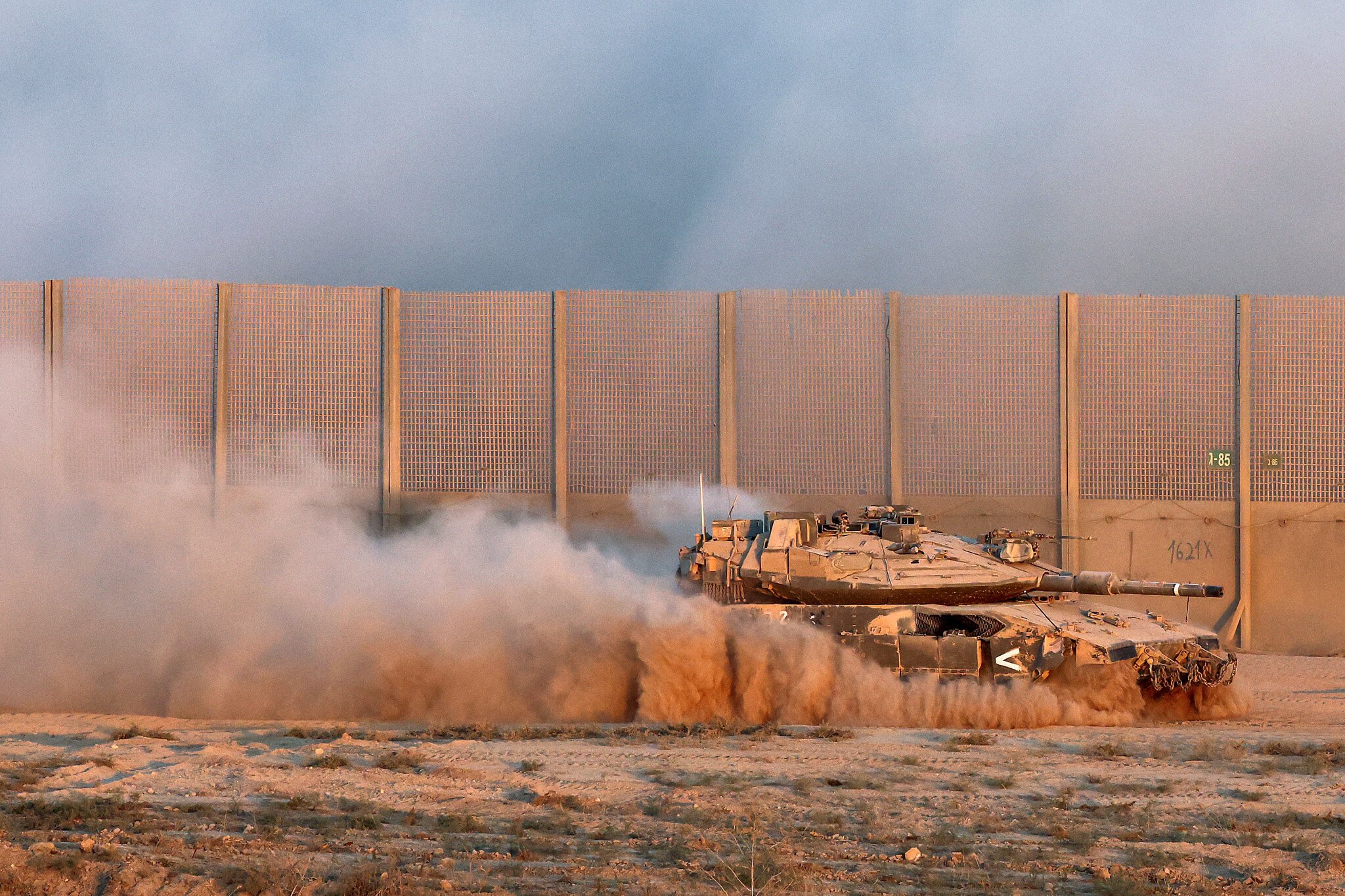 An Israeli military armored vehicle moves near the border fence with the Gaza Strip on September 17, 2025 (Jack GUEZ / AFP)
An Israeli military armored vehicle moves near the border fence with the Gaza Strip on September 17, 2025 (Jack GUEZ / AFP)The statement referred to a report released Tuesday by a commission of UN experts, which accused Israel of committing genocide in Gaza. The panel’s findings were roundly rejected by Israel.
Israel has also strenuously contested accusations that there is a humanitarian crisis in Gaza, saying that it makes efforts to deliver aid to Gaza’s civilians. It has accused the United Nations of delays in distributing aid and charged Hamas with stealing the supplies.
Israel’s Coordinator of Government Activities in the Territories, known as COGAT, said that nearly 230 trucks carrying humanitarian aid entered the Strip on Tuesday through the Kerem Shalom and Zikim crossings.
According to COGAT, some 250 trucks’ worth of aid were collected by the United Nations and other international organizations from the Gaza side of the crossings Tuesday to be distributed. Similar amounts of aid deliveries have been reported daily in the past few weeks.
“The contents of hundreds of trucks are still awaiting collection on the Gaza side of the crossings,” COGAT said.
The UN has said 600 trucks of aid need to be distributed each day in order to properly feed the Strip’s roughly two million people amid the war.
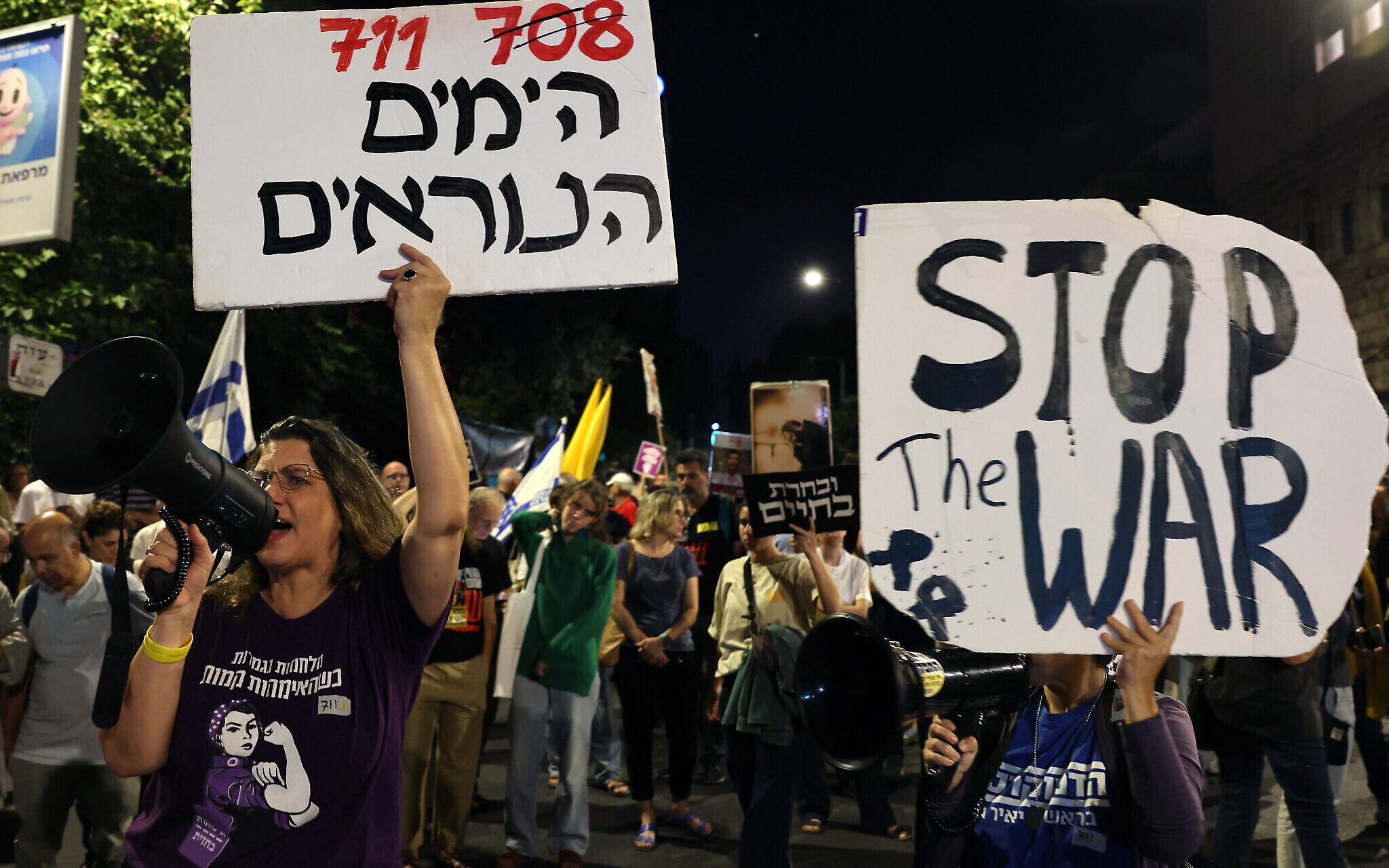 Protesters call for an end to the war and a ceasefire-hostage deal on September 16, 2025 (AHMAD GHARABLI / AFP)
Protesters call for an end to the war and a ceasefire-hostage deal on September 16, 2025 (AHMAD GHARABLI / AFP)COGAT also said that “tankers of UN fuel entered for the operation of essential humanitarian systems” yesterday, and that it coordinated the entry and exit of humanitarian aid workers rotating in and out of Gaza.
The Hamas-run Gaza health ministry says more than 64,000 people in the Strip have been killed or are presumed dead in the fighting so far, though the toll cannot be verified and does not differentiate between civilians and fighters. Israel says it has killed over 22,000 combatants in battle as of August and another 1,600 terrorists inside Israel during the October 7 onslaught, in which Hamas-led invaders killed some 1,200 people.
Israel has said it seeks to minimize civilian fatalities and stresses that Hamas fights from civilian areas, including homes, hospitals, schools, and mosques.
Israel’s toll in the ground offensive against Hamas in Gaza and in military operations along the border with the Strip stands at 465. Link
Gaza’s makeshift clinics at risk of collapse as urgent supplies run out, study says
Peer-reviewed research finds improvised medical points overwhelmed, under-equipped, and continuously targeted after nearly two years of war
Gaza’s improvised medical points (MPs), makeshift clinics set up in tents and temporary shelters — some operated by the Hamas-run Health Ministry and others by nonprofits or voluntary teams — are struggling to provide even basic care amid severe shortages of medicines, equipment, and trained staff, a peer-reviewed study published Wednesday warned.
Published in PLOS Global Public Health — described on its website as “an open access forum for research that reaches across disciplines and regional boundaries” — the study highlights how these small units, established as substitutes for hospitals, have been degraded and overwhelmed throughout nearly two years of war.
Responding to the report, Israel said it continues to facilitate the entry of medical supplies into the Gaza Strip, while maintaining constant contact with aid groups.
The state of Gaza’s health sector has been at the center of international controversy throughout the ongoing conflict. Israel has repeatedly struck in and around medical facilities, operations that have drawn condemnation from humanitarian organizations and foreign governments alike.
Most recently, in August, the IDF carried out a tank shelling on Nasser Hospital in Khan Younis, killing at least 20 people, according to the Hamas-run Gaza Health Ministry, including rescue workers and journalists. Footage showed rescue personnel who had arrived at the site of an initial attack engulfed in smoke and debris when a second strike hit.
Israel insists that Hamas has systematically embedded itself inside Gaza’s hospitals, turning them into military hubs and thereby stripping them of the protections they are guaranteed under international law.
Documents from the Hamas Ministry of Interior and National Security, dating back to 2020 but declassified by the IDF last week and publicized by NGO Monitor, appeared to support this claim. The files detail how Hamas used hospitals to shelter operatives, host leadership meetings, and establish a secure communications infrastructure, while imposing restrictions on international aid groups to prevent exposure of its activities.
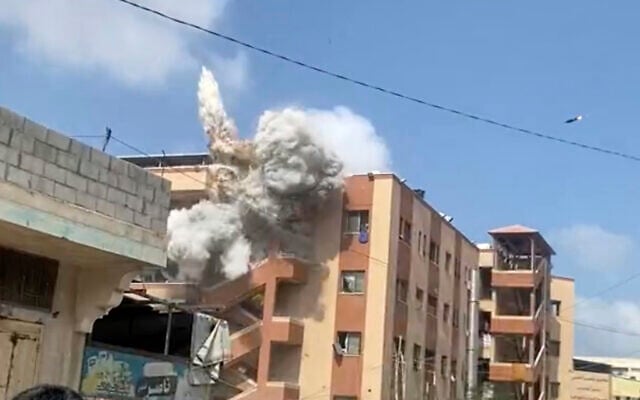 This frame grab from a video shows the second of two projectiles the Israeli army fired in quick succession at a stairwell outside Nasser Hospital, just minutes after an initial round of attacks hit the building in Khan Younis, Gaza Strip, Monday, Aug. 25, 2025. (UGC via AP)
This frame grab from a video shows the second of two projectiles the Israeli army fired in quick succession at a stairwell outside Nasser Hospital, just minutes after an initial round of attacks hit the building in Khan Younis, Gaza Strip, Monday, Aug. 25, 2025. (UGC via AP)The PLOS study documented the reality of Gaza’s collapsing health system in stark detail.
Researchers surveyed 28 MPs throughout the Strip between October and December 2024, finding facilities crippled by shortages that left many unable to provide safe or reliable care. Essential drugs such as insulin, cancer treatments, and epilepsy medication were almost entirely absent, while antibiotics, psychiatric medicines, and even basic painkillers were rarely available.
Equipment was similarly scarce. Only a handful of MPs had oxygen supplies, and just two had functioning refrigerators to store vaccines or temperature-sensitive drugs. Trauma supplies, including suture kits and sterilization materials, were missing in many locations. In some cases, units operated without even basic sanitation, lacking soap, disinfectant, or sewage drainage.
“The severe shortage of critical medical equipment… severely limits the capacity of MPs to deliver adequate care, particularly for trauma and critical patients,” the authors wrote. “The absence of these supplies is likely contributing to preventable deaths.”
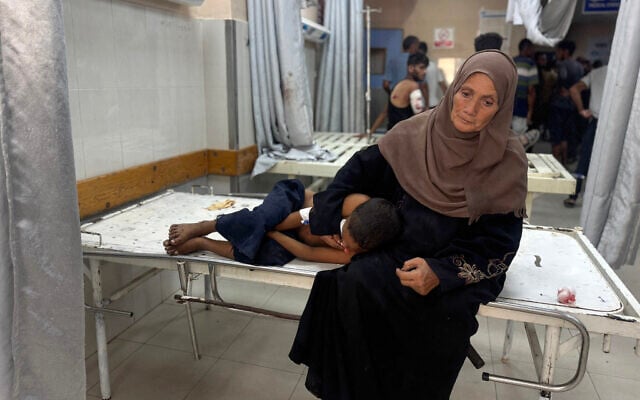 A Palestinian woman comforts a child at Nasser Hospital in Khan Yunis, August 31, 2025. (AFP)
A Palestinian woman comforts a child at Nasser Hospital in Khan Yunis, August 31, 2025. (AFP)The article also painted a picture of an overburdened workforce. With a median of only seven personnel per MP, sites treated an average of 117 patients daily. Two-thirds of staff reported having received no training since joining, and many had no access to psychosocial support despite operating under constant stress. Salaries were irregular, and in some cases, nonexistent.
During the survey period, at least one health worker was killed in an IDF airstrike and several others were injured, while two facilities sustained direct damage.
Services provided were patchy and limited. Almost all sites offered general primary and pediatric care, but fewer than half provided trauma or maternity services. Mental health provision was “nearly absent,” despite widespread need. Vaccination campaigns, prenatal checkups, and nutrition programs were available only sporadically.
The findings coincided with a situation update released September 10 by the UN Office for the Coordination of Humanitarian Affairs (OCHA), which described Gaza’s health system as “overwhelmed by the influx of mass casualties” and critically short on blood.
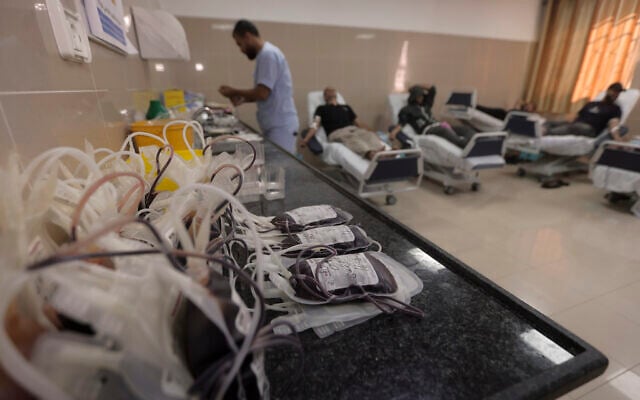 Palestinians donate blood at Nasser hospital in Khan Younis, southern Gaza Strip, Thursday, Nov. 16, 2023. (AP Photo/Mohammed Dahman)
Palestinians donate blood at Nasser hospital in Khan Younis, southern Gaza Strip, Thursday, Nov. 16, 2023. (AP Photo/Mohammed Dahman)On September 7, the Hamas-run Gaza Health Ministry issued an urgent appeal for blood donations after the Strip’s last delivery of 6,000 units — received on August 4 — was consumed within 20 days. Aid officials estimate that Gaza requires 350 units daily, but the number of donors has plummeted amid widespread hunger, disease, and displacement.
The United Nations Population Fund (UNFPA) also warned of “catastrophic consequences” for women and girls if fighting continues in the Strip. Four hospitals and 23 clinics offering obstetric and newborn care in Gaza City were described as being “at imminent risk of shutdown,” while southern facilities have already been stretched beyond capacity. More than 465 women gave birth outside hospitals in the first seven months of 2025, many without any medical support, according to UN data.
In an attempt to fill the gap, UNFPA and its partners opened a new field maternity hospital in August, equipped for cesarean sections and gynecological surgeries, and delivered six truckloads of reproductive health kits to support more than 200,000 sexual and reproductive health services.
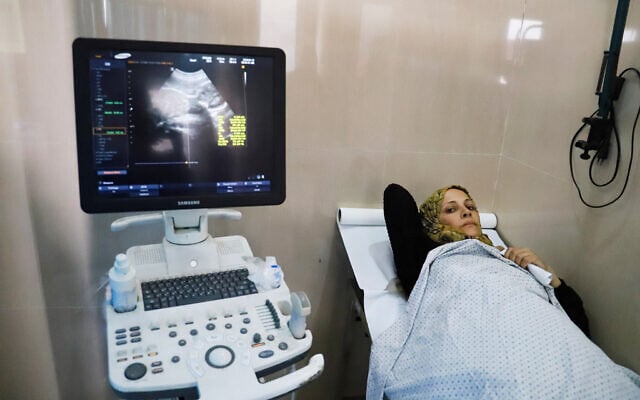 Fatima Arfa, a pregnant and displaced Palestinian woman, undergoes a medical check-up at Al-Helou hospital in Gaza City, in the northern Gaza Strip, July 10, 2025. (Ebrahim Hajjaj/Reuters)
Fatima Arfa, a pregnant and displaced Palestinian woman, undergoes a medical check-up at Al-Helou hospital in Gaza City, in the northern Gaza Strip, July 10, 2025. (Ebrahim Hajjaj/Reuters)Even these emergency measures remain vulnerable. On September 8, Medical Aid for Palestinians (MAP), a British charity providing medical services in the West Bank, Gaza, and Lebanon, reported that an MP it supported through its partner, the Gaza-based health organization Ard El Insan, was forced to shut down after sustaining damage from a nearby strike.
In response to the PLOS findings and broader criticism, the Defense Ministry’s Coordinator of Government Activities in the Territories (COGAT) agency said Israel has continued to facilitate the transfer of humanitarian aid into Gaza, including medical supplies and medicines. According to the agency, more than 3,500 tons of medical equipment have entered the Strip in recent weeks, with deliveries coordinated in advance and carried out in cooperation with international aid groups.
COGAT also said the IDF maintains regular contact with international organizations working in Gaza in order to support hospitals and field facilities, and pledged that Israel would continue to enable the entry of medical equipment in line with international law.
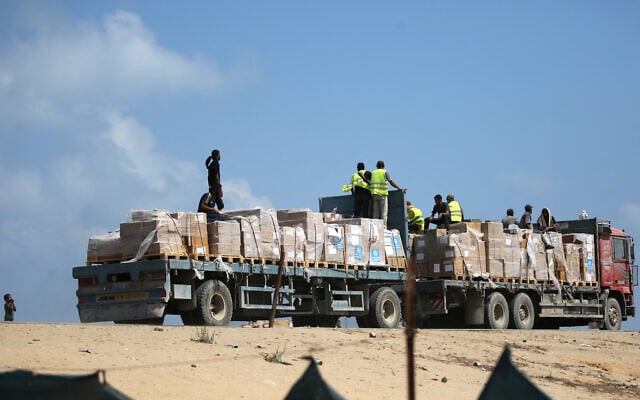 A truck transporting humanitarian aid drives down a road in Deir al-Balah in the central Gaza Strip on August 21, 2025. (Eyad Baba/AFP)
A truck transporting humanitarian aid drives down a road in Deir al-Balah in the central Gaza Strip on August 21, 2025. (Eyad Baba/AFP)In a statement responding to a letter published earlier this year by the Israel Medical Association urging greater access to medical supplies, COGAT said it had supported international aid organizations in establishing 13 field hospitals in Gaza, equipped with essential supplies.
At the same time, COGAT stressed that measures are being taken to prevent Hamas from diverting humanitarian supplies for military use.
Critics, however, contend that more needs to be done in order to shield civilians from the wider impact of the war.
“What we are seeing in Gaza City is not collateral damage; it is the predictable and preventable result of deliberate Israeli policies and actions that harm civilians and healthcare in violation of international humanitarian law,” said Fikr Shalltoot, MAP’s Gaza director.
“The UK and other governments must not continue to stand by while civilians are bombed, starved, and systematically denied lifesaving aid,” she said. Link
Palestinians say 40 killed in Gaza strikes; children’s hospital targeted by drone, no injuries
At least 40 people were killed across the Gaza Strip today in Israel’s latest strikes, including 30 in Gaza City, Hamas-run local health authorities says. They also report a drone attack on a specialist children’s hospital, which did not cause casualties but forced young patients and their families outside.
A day after Israel announced the launch of its ground offensive to seize control of Gaza’s main urban center, tanks had moved short distances towards the city’s central and western areas from three directions, but no major advance was reported.
An Israeli official said military operations were focused on getting civilians to head south and that fighting would intensify over the next month or two.
The Hamas-run government’s Ministry of Health says an Israeli drone dropped grenades on one floor of the Rantissi children’s hospital. No casualties were reported but the ministry said some 40 families took their children away.
“This hospital is the only specialist facility for children with cancer, kidney failure, and other life-threatening conditions – but even these gravely ill children are not spared from relentless bombardment,” says Fikr Shalltoot, Gaza director at the UK-based charity Medical Aid for Palestinians.
The Israeli military did not immediately respond to a request for comment.
The Hamas figures could not be verified and do not differentiate between civilians and combatants.
WHO chief says northern Gaza hospitals on ‘brink of collapse’ due to new offensive
The World Health Organization chief warns that Israel’s ground offensive in northern Gaza has left already overwhelmed hospitals on the “brink of collapse” and demands an “end to these inhumane conditions.”
“The military incursion and evacuation orders in northern Gaza are driving new waves of displacement, forcing traumatized families into an ever-shrinking area unfit for human dignity,” Tedros Adhanom Ghebreyesus says on X, warning that “hospitals, already overwhelmed, are on the brink of collapse as escalating violence blocks access and prevents WHO from delivering lifesaving supplies.”

Confirming Lebanon strike, IDF says it killed Hezbollah member who directed attacks on Israel
The IDF confirms carrying out a drone strike in Lebanon’s northeastern city of Baalbek last night, killing a Hezbollah operative.
According to the military, the Hezbollah operative Hussein Sharif was a senior weapons dealer and supplier, and worked from Lebanon to direct terror cells in Syria to carry out attacks against Israel.
His actions “constituted a violation of the understandings between Israel and Lebanon,” the IDF adds.
- IDF on guard: Lone-wolf terror threatens to spread in the West Bank
As the IDF battles Hamas in Gaza, a new wave of lone-wolf attacks surges in the West Bank—forcing the military to shift tactics and crack down on incitement; security officials warn violence could ignite a broader conflictAs IDF forces press the ground offensive in Gaza, the military is grappling with a surge in so-called lone-wolf terror attacks in the West Bank. Recent incidents include the deadly shooting at Jerusalem’s Ramot junction, an improvised explosive device near the Nitzanei Oz crossing and a stabbing at a hotel in Kibbutz Tzuba. While the attacks are unconnected, officials say that is precisely what defines the phenomenon.“Less than an hour after the Jerusalem attack, we were already at the homes of the terrorists,” a senior security official said. “We know that quick, decisive action—closing off villages, retracing the attacker’s steps and detaining anyone involved—sends a clear message: any village that produces an attack will pay a price.” According to the official, organized terror networks in northern West Bank refugee camps like Jenin and Tulkarm have been dismantled, reducing overall activity. But the risk has shifted. “The fear now is a wave of lone attackers,” he said. “When an attack ends with casualties, it can encourage copycats.” IDF Central Command chief Maj. Gen. Avi Bluth has directed rapid actions for deterrence. If an attack cannot be stopped in advance, the aim is to swiftly reach the perpetrator and impose consequences. That includes sealing off homes immediately after attacks, pending legal proceedings and demolition orders. “Residents must know that if an attacker comes from their village, the army will shine a spotlight on it,” the officer explained. “That village will face increased scrutiny, law enforcement and action against illegal building.” Crackdown on terror incitement Security forces are also targeting terror incitement, which they see as fueling lone attacks. Data obtained by Ynet show that since the start of 2025, 255 indictments have been filed for incitement and support of hostile organizations out of 433 cases opened by police. Some 343 suspects were arrested, with 294 held until the end of proceedings. In Hebron alone, eight suspects—including a schoolteacher—were recently arrested for praising terror groups and calling for attacks on Israeli soldiers and civilians. Indictments cite social media posts such as: “Long live jihad, long live liberation—the armies will march until the final reckoning with the enemy,” and “Uproot the Jewish entity completely, carry the flag of jihad and liberate al-Aqsa.” The Israel Police’s Judea and Samaria District stresses that social media feeds have become “a crime scene,” requiring intensive monitoring, device seizures, translation of Arabic posts, and joint work with the IDF, Shin Bet and prosecutors to bring swift charges. IDF adapting tactics to face threat Officials say the army has scaled back airstrikes in the West Bank, relying instead on ground operations. “I can reach a target within minutes, so why launch an airstrike?” the senior officer asked. He said expanded patrols, new access roads and round-the-clock presence of troops have made aerial strikes largely unnecessary. Still, failures remain. The officer cited the murder of Tzeela Gez and her infant son Ravid, noting that the terrorist had previously carried out at least two attacks without being caught. “That cannot happen again,” he said. Preparing for political shifts The IDF is also preparing for possible political developments, such as international recognition of a Palestinian state or an Israeli move to annex West Bank territory. Plans are in place to maintain stability under any scenario. Military officials warn that fighting in Gaza could spill over into the West Bank, drawing more Palestinians into violence. “There is always an undercurrent here,” the officer said. “The greatest concern is something now taking shape beneath the surface—before we can even see it.” link 3 Palestinians injured in West Bank clash with settlers; IDF: Incident began when an Israeli was attacked
Settlers arrived yesterday evening at the outskirts of the West Bank village of Taybeh, near Ramallah, at a place where two Bedouin families live, with videos from the scene showing them stealing sheep and goats and apparently beating a man who is behind a fence and isn’t seen in the footage.
The IDF tells The Times of Israel that “a report was received of an Israeli civilian who was attacked by several Palestinians near the village of Taybeh in the Binyamin region,” and forces rushed to the scene to resolve the incident upon receiving the report.
“The Israeli civilian was lightly injured and received medical treatment at the scene,” the military says. “Shortly afterward, another clash was reported between Israeli civilians and several Palestinians on the outskirts of Taybeh. Security forces rushed to the scene and, upon arrival, fired warning shots in the air to disperse the confrontation; no one was injured by the gunfire. Two Palestinians were identified at the scene as lightly injured from a physical confrontation and received medical treatment at the site.”
Footage shows a lone settler walking with his own flock near the house and giving it water from a tank on site. Later, additional settlers arrive along with army and police forces, and settlers are seen beating one of the Palestinians.
Meflah Melihat, one of the residents whose flock was stolen, tells The Times of Israel that at the start of the incident, a single settler came to the site and entered one of the residents’ homes. A few minutes later, dozens of settlers arrived together with Israel Defense Forces soldiers, and the settlers beat Melihat’s wife, brother and neighbor, using sticks and their bare hands. The two men are now hospitalized in Ramallah.
The residents allege that over 100 goats and sheep were stolen.
The Israel Police will further probe the incident, the IDF says. link These settler terror attacks on Palestinians will not stop or even be reduced until this corrupt government takes legal actions and responds to each attack with an iron fist. These attacks are terrorist attacks, nothing less. Most of the world recognizes it and many in Israel do as well. But the extremist government in power today is a government that has no regard for law and order, especially not for themselves. They are trying to overthrow the Israel legal system and take all of the power of justice onto themselves. That would make the situation of today look like candyland in comparison to what they want. At present, the extremist parties and ministers are dictating all government directions and actions. One of them, Ben Gvir, the Minister of Internal 'Insecurity' is responsible for the police but he chose to make them hi private militia doing his bidding. Parts of his bidding include using the police to take away the right of demonstrating and protesting for the hostages as well as against the government. Regarding the settler terror attacks, this criminally convicted minister has instructed the police not to react or respond to any of these settler terror attacks, and if they do respond or are in the aread of the attack, the police ar to do nothing to intervene, not to break it up, not to arrest settlers, not to do anything that can jeopardize the settlers' actions. If the police need to arrest anyone, it is the Palestinian victims that they arrest who are then held without bail and generally must remain in custody until the end of their trial. The Palestinians are subjected to our Military's law because they live under a military occupation. In the IDF's military courts, there is a 99.9% chance that they will convicted of whatever charges are brought against them as opposed to any settler who may, in the very rate occassions, be brought before a judge in Israeli courts. There, they have a 99.9% chance of being released to house arrest or released altogether with no charges, and the rare ones under house arrest generally are released from that within days. There is no justice.
- Politics and the War and General News
Smotrich says Israel sitting on a ‘real estate bonanza’ in Gaza, talking to the US about dividing it up
Finance Minister Bezalel Smotrich says that the Gaza Strip is a “real estate bonanza,” and that he is in talks with the Americans on how to divide it up the coastal enclave after the war.
There is “a real estate bonanza” in Gaza that “pays for itself” and he has “already started negotiations with the Americans,” Hebrew media quotes the far-right minister saying at a real estate conference in Tel Aviv.
“We have poured a lot of money into this war. We have to see how we are dividing up the land in percentages,” Smotrich says, adding that “the demolition, the first stage in the city’s renewal, we have already done. Now we just need to build.”
US President Donald Trump has at times spoken of his desire to turn the Gaza Strip into an American-controlled “Riviera” in a move that would see much of the Palestinian population encouraged to leave after the war.
Last month, the Washington Post reported that Trump administration was weighing a proposal for the postwar reconstruction of Gaza that would put the Strip under US control for a decade and pay roughly a quarter of its population to relocate, many of them permanently.
Trump’s plans have been rejected by the Palestinians, the Arab world, and much of the international community.
Prime Minister Benjamin Netanyahu has said Israel has no plans to resettle the Strip, but far-right members of his government, including Smotrich, are actively advancing plans to do so.
Smotrich also repudiates Netanyahu’s statement on Monday that Israel was facing increasing isolation and may be required to become a self-reliant economy with “autarkic characteristics” and a kind of “super-Sparta.”
“I do not agree with the prime minister’s words and I really did not like the comparison to Sparta,” he says.
Netanyahu’s comments sparked fierce criticism from opposition heads and business leaders and were followed by a dip in the value of shares on the Tel Aviv Stock Exchange.
In response, the prime minister said on Tuesday that he had “full confidence” in the Israeli economy and sought to clarify that his comments were focused on the defense industries rather than the broader economy. link Both Smotrich and Ben Gvir have every reason in the world to be optimistic that their wildest dreams can come true. They received their biggest endorsement from Trump when he presented his illegal and ridiculous plan for Gaza which he called Trump's Gaza Riveria. The plan calls for the expulsion of all Palestinians from Gaza, so that Gaza can be rebuilt in Trump's vision. Immediately following his media release of his Gaza Riviera plan did Netanyahu endorse and encourage Trump's plan and ordered a new office in the Defense Ministry to be added to 'aid' in the 'voluntary emigration' of Gazans from Gaza. And the person in charge of that office is no other than Smotrich, the racist extremist messianic. This is truly his dream of dreams. He has promoted the expulsion of Palestinians from the West Bank for years as well as massive settlement building there. As the minister in the Defense Ministry, Netanyahu gave him charge of all the civilian matters of the West Bank. He has used his dual minister portfolios to do just that. As the finance minister, he holds the purse strings. As the minister in the Defence ministry, he has been pushing budgets and additional monies into the West Bank settlements and given them carte blanche to build, expand and steal more Palestinian lands. Through the active encouragement and promotion of these activities, they have been very successful in getting more settlers to commit more and more terror attacks against Palestinians, all with the goal of making their lives intolerable and forcing them into 'volutary emigration'.
With Trump's plan and Netanyahu's immediate adoption, they have been forcing Netanyahu to keep the war going in order to empty Gaza from Palestinians and have their 'real estate bonanza' and endless Jewish only settlements throughout Gaza. The international implications and war crimes associated with all of these actions have absolutely no impact on these criminals. They can only see the things they are able to achieve in this corrupt and failed government where their threats to bring down the government together with Netanyahu's narcissistic need to stay prime minister, have given them to power to drive and direct this extremist Netanyahu government to do everything that they want without any regard to the price the country will have to pay.Tel Aviv shares plunge again as EU mulls cutting trade over Gaza offensive
Trump said to tell top aides Netanyahu is ‘f–king me’ but won’t break publicly with PM
US President Donald Trump recently told top aides that Prime Minister Benjamin Netanyahu is “f–king me,” according to a report in the Wall Street Journal that says despite the American leader’s frustrations with the Israeli premier he is unlikely to publicly break with him.
A senior Israeli official quoted in the report says that Netanyahu and Trump have excellent ties and that any notion otherwise is “fake news,” while people who know them both describe them as kindred spirits.
US officials tell the paper that Trump is proud of his close rapport with Netanyahu and strong backing for Israel, and doesn’t want to publicly break with the prime minister. Link This isn't the first time that Trump has been furious with his BFF. The first time that he felt that Netanyahu fucked him was when Netanyahu convinced him to leave the Iran Nuclear deal. Netanyahu convinced Trump that immediately upon leaving the deal, the Iranians would come crawling back to him on all fours asked for a deal that would be much more to Trump's liking. None of that materialized, which infuriated Trump and also brought the world much closer to a nuclear Iran (Thank you Netanyahu and Trump).
There is almost wall to wall world consensus that the war is till going on the satisfy Netanyahu's political self interests, his war of political survival. Trump is not only aware of this, he has made semi public statements attesting to it. Netanyahu's quest for political survival and to rehabilitate his destroyed legacy, will not allow the war to end. It serves his political plan. It doesn't matter that the overwhelming majority of Israelis want the war to end and the hostages to all be brought home. That doesn't move him one bit. He strongly believes that his tradional voter base has bought his entire package, the rewriting of the narrative of October 7 where he bears no responsibility for the massacre of for anything he did for years to bring us to October 7, the false narrative that he has been the only one who could have brought home 203 hostages (accepting that he is not at all responsible that there were any hostages), and that the need to continue the war is to safeguard Israel for the future. Despite that he personally has destroyed any inclination for anyone to believe that he is Mr. Security, Netanyahu has the strong belief that, with enough time, the Israeli public will forget his role in October 7, everything that happened before and his mismanagement of the war and the hostage crisis.
The only one who can end the war is the one person who Netanyahu cannot say no to and that is Trump. We need Trump to furious enough with Netanyahu that he won't give him even a second to plead his case. Netanyahu, until now has successfully manipulated Trump to allow him to continue with this war and ruining the country. We need Trump to wake up and smell the roses, actually the Netanyahu bullshit, and to say, no more! It ends now and not allow Netanyahu to do or say anything that will keep the war going. That is our only hope, for the hostages, for the country, for our future.- Netanyahu’s quest for political survival isolates Israel despite security and diplomatic warningsAnalysis: Israel faces mounting isolation as Gaza operations strain peace accords, erode U.S. and European backing and fuel antisemitism abroad; critics warn prolonged conflict risks security, economy and the country’s global standingIn recent years, Prime Minister Benjamin Netanyahu has turned Israel’s foreign policy into a tool for his personal political survival, systematically ignoring warnings from senior security officials, cabinet ministers and even international allies.While he continues to emphasize Israel’s economic strength and declares the country will withstand any boycott or sanctions, reality on the ground tells a troubling story: IDF operations in Gaza, lacking broad international backing, are driving Israel into unprecedented isolation.Foreign Minister Gideon Sa’ar, for example, warns at every opportunity of the heavy price Israel is paying internationally. But he is only one voice in a growing chorus of critics. Still, Netanyahu appears to listen only to his most hardline partners, National Security Minister Itamar Ben-Gvir and Finance Minister Bezalel Smotrich.Fears of military rule in GazaThe most striking example is the botched assassination attempt against Hamas leadership in Doha. Reliable reports revealed that top security officials, including Mossad chief David Barnea, strongly opposed the timing. They repeatedly warned of diplomatic risks and chain reactions that could damage Israel’s ties with Gulf states, which serve as key mediators in negotiations with Hamas. Netanyahu, however, focused only on his political survival, ignoring the warnings. The result has been growing tensions with Qatar and other states, making hostage negotiations increasingly difficult. Even before the Doha operation, disagreements between Netanyahu and the defense establishment deepened over the decision to fully capture Gaza City. IDF Chief of Staff Lt. Gen. Eyal Zamir urged Netanyahu in a cabinet meeting to halt the offensive and pursue a deal. Zamir expressed fears of military rule in the Strip, supported by Sa’ar, Barnea and National Security Council head Tzachi Hanegbi, who themselves criticized Netanyahu. Zamir presented Netanyahu with a detailed comparison of two options: siege and targeted raids in the city versus full occupation. He weighed risks to soldiers and hostages, humanitarian fallout, manpower limits and international legitimacy. In every parameter, Zamir’s plan outperformed full occupation — yet Netanyahu rejected it outright. “The chief of staff did everything to convince him otherwise, but made clear he would carry out the plan,” senior ministers said. Smotrich: Turn Gaza into a ‘real estate bonanza’ The reason for Netanyahu’s dismissals is simple: he depends on Ben Gvir and Smotrich, who push for a hardline policy in Gaza and reject any compromise. For them, the war is an opportunity to expand Israeli territorial control. For Netanyahu, it is the way to preserve his coalition. As a result, Israel risks long-term damage. Just Wednesday, Smotrich addressed the “day after” in Gaza, saying it should be turned into a “real estate bonanza.” Speaking at an urban renewal conference, he said he had already opened talks with the Americans on investing in reconstruction as real estate projects. “I’m not joking, it pays for itself,” he said. Peace agreements at risk Some of Israel’s most valuable assets are its peace agreements with Egypt and Jordan, as well as the Abraham Accords with Gulf states. These are not just diplomatic deals but also a strategic safety net for intelligence, security and economic cooperation. The ongoing war in Gaza now puts them at risk. If suspended or canceled, it could take years to rebuild ties. Already, the United Arab Emirates and Bahrain — Abraham Accords signatories — are voicing growing discomfort with Israel’s actions. Public pressure in those states could force leaders to freeze relations. The UAE has warned Israel against annexing territory in the West Bank, saying it would harm the peace deal. Similar warnings have come from Bahrain, Jordan, Egypt and Morocco. Europe presents further challenges. Israel currently has no ambassadors in Spain, Norway or Ireland. Jerusalem now threatens to close the French consulate over Paris’ recognition of a Palestinian state. Other punitive steps have not stopped European countries from hardening positions. In France, officials are even considering limiting Mossad’s presence, which has long cooperated with local authorities in thwarting terror attacks. Eroding support in Washington The situation is no better in the United States, Israel’s closest ally. Support among Democrats has long eroded, but now Republicans are showing cracks as well. President Donald Trump and his allies still back Israel, but many in the party are calling to distance themselves from Netanyahu. Some MAGA supporters are urging an end to the military aid Israel has received since the peace with Egypt, which underpins its border and homeland security. Diplomatic projects have already been frozen, with Israeli envoys worldwide told this is “not the right time.” Officials suggest such projects may only resume once the war ends. Losing the battle for public opinion Since October 7, global media and social networks have portrayed Israel as the aggressor, while Hamas has gained unexpected international sympathy. Israel has suffered a major defeat in the battle for global opinion, particularly among younger generations. The wave of antisemitism that followed the October massacre in Israeli border communities has only grown. Jewish communities in the U.S., Canada, Australia and across Europe now face daily harassment. The world no longer distinguishes between Israel and Jews — both are targets. Sa’ar’s remarks in the cabinet were a wake-up call. He said that “to restore our standing we need a cease-fire. Only then can we show the normal sides of the Israeli story. As long as the war continues, the flames will not be extinguished. The consequences will be economic as well. Israelis and Jews abroad are already feeling it.” But his warnings went unheeded. Netanyahu dismissed calls for a cease-fire, insisting only on Hamas’ “total surrender,” while security chiefs continue to warn that military rule in Gaza would create a dangerous vacuum and fuel further escalation. A new ‘axis of evil’? Meanwhile, Diaspora Affairs Minister Amichai Chikli argued that Israel must fight back against sanctions and international campaigns. He said Qatar, Turkey and Syria form a new “axis of evil,” accusing Qatar of buying influence in London and harboring Hamas leaders. “This is a diplomatic battlefront,” he said, “and Qatar has become a pariah state.” Now the question remains: Can Israel afford to continue this path? However strong its economy, prolonged international isolation would hurt its security, global image and ultimately the economy itself. If Netanyahu does not change course, isolation may soon become reality. link This article gives a fairly good picture of the situation that Israel is in, that Netanyahu has put Israel. In every arena, in everything that Netanyahu touches, he has shown us and the world that he is a failed leader and is dangerous for the future of Israel. Every statement he makes and every action he takes further alienates the State from the rest of the world. All of his actions regarding the continuing war and the hostages is in direct opposition to the professionals and others in his cabinet who agree with the professionals. He doesn't heed any warning by the top security professionals or his diplomatic echelon and every single thing he does and says is directly connected to his political survival. He focuses on 3 people: Smotrich, Ben Gvir and Trump. His extremist messianic coalition partners, Smotrich and Ben Gvir are both criminals in their actions and words, and at an earlier time in Israel's history, both of their parties which are racists in nature would have been outlawed like Ben Gvir's predecessor party, Kach and both would have been criminally charged and most likely convicted of support of and belonging to a terrorist organization, as Ben Gvir had been convicted of previously. Netanyahu, instead of keeping with the norms of society, routing out racism and keeping them on the fringes, took both of these extremists into his government, giving them senior positions, normalizing their fringe ideologies of racism and messianism, all for his to put together a government so he could continue being prime minister. As such, he has allowed and enabled these 2 and their racist parties to set government policy and dictate the direction of the war and the continuation of the war in order to politically survive because without them, his government would fall apart. Normal and proper leaders who are first and foremost concerned with the well being of the country and population, would see war as a last resort and work very hard to end wars and bring about diplomatic solutions. Ben Gvir and Smotrich's messianic ideologies see the war as opportunities to get rid of as many Palestinians as possible in whatever ways they can (expulsion through 'voluntary emigration', making their lives so miserable they will only want to abandon their homes and leave, and killing through the war or through settler terrorism), and then take over all of the territories to set up Jewish only settlements throughout. The war is a major means to an end for them and will only be satisfied and willing to end the war when they are able to achieve their messianic colonialist goals.
The third person that concerns Netanyahu is Trump. He is the only person in the world (except for his wife) that he cannot say no to. They are two peas in a pod, 2 wannabe dictators who have successfully created autocratic governments where their word is final and have veto over everything. There are differences between them. Netanyahu is weak and cowardly and has enabled his extremist partners to be the tail that wags his dog. He needs them so much that there are no restraints to what he will do to keep them in his coalition. In the Netanyahu/Trump relationship, they are carbon copies of each other and have learned from each other how to take and retain more and more power and disregard any democratic norms. The difference between them is that Netanyahu is much smarter than Trump and has been able to manipulate Trump to his will almost every single time. There have been a few occasions in the recent past that Netanyahu was sure that he wouldn't be able to manipulate Trump and was making his plans accordingly. An example of this was his last White House visit. He was certain that Trump was going to force him into a deal to end the war, so Netanyahu had his people meeting with certain opposition leaders to try to get them to join his government and provide a safety net so his government wouldn't fall when Smotrich and Ben Gvir would bolt due to the deal to end the war. His efforts with the opposition failed but he succeeded in once again manipulating Trump to his will. Since then, Trump has given Netanyahu the green light for everything. The Hamas videos of Rom Braslaski and Evyatar David starving and looking like Holocaust survivors worked against Hamas and infuriated Trump, and gave Netanyahu full support to decimate Hamas whatever it took and however long it took. However, Trump is unpredictable and unstable. What he says one day can change completely the next day. The one thing that doesn't change is his desire/need to win the coveted Nobel Peace Prize. When he sees that Netanyahu's actions are going to jeopardize his chances, all bets are off and his demands of Netanyahu to end the war and bring home all the hostages goes back onto the table.
This was exactly what happened over the last 2 weeks. Trump presented a deal to end the war and bring home all the hostages on the first day of the war. He told Netanyahu that this was the deal and Netanyahu had no choice but to accept. It was now in Hamas' hands and their senior diaspora leadership gathered in Qatar to discuss and accept Trump's deal. Despite Netanyahu's inability to refuse Trump and his deal, he looked desperately for an out and found it with his plan to attack the Hamas meeting to kill the senior leadership. He apparently received Trump's green light despite all of the denials from the administration and Netanyahu himself. If it would have succeeded, Trump would most likely have praised it as a win against the barbaric terrorist organization. But the operation failed miserably and Trump hates failures especially if they can be tied to him. That is the main reason for the denials. It made Trump look bad on so many levels. It has reached the point that Trump, once again is saying that Netanyahu screwed him, but he won't say that himself publicly, yet. However, it can bring back Trump's pressure to Netanyahu to accept a deal to end the war. Unfortunately, though, the failed Qatar assassination operation changed the dynamics. Prior to the attack, there was a good chance that Hamas would accept Trump's personal guarantees that he would not allow Israel to go back to fighting at the end of the ceasefire, even if all the elements of the agreement were still not finalized. He would have backed up his guarantees with a physical security forced headed by a US general to maintain and enforce the ceasefire and all agreements. Following the attack, Hamas leadership believes that Trump actually set them up for the assassination attempt. The world knew they were going to be convening in Doha to discuss Trump's plan and therefore will no longer accept Trump's personal guarantees, at this time. There is still hope that Trump will somehow sweeten the deal for Hamas and they will finally agree and the war will end. The next days and weeks will be the time that this can happen. - October 7 families' memorial ceremony to be held in Yarkon Park
The "Kumo" movement and October 7 families announced that they will hold this year's national memorial ceremony in Yarkon Park (Ganei Yehoshua), and that a website for ticket registration has been opened. The ceremony will be hosted by actor Tzachi Halevi and Ashira Greenberg, wife of Lt. Col. Tomer Greenberg of blessed memory. "The families are calling on the general public to continue to mobilize and support the crowdfunding campaign until the goal is reached - so they can increase the ticket supply and hold a ceremony for tens of thousands of Israelis," they stated. The Region and the World Saudi Arabia condemns Israeli ground operation in Gaza City ‘in strongest terms’
Saudi Arabia condemns “in the strongest terms” the Israeli ground operation in Gaza City, a day after Israel unleashed a long-threatened ground assault on the city.
The kingdom also urges members of the UN Security Council to act to halt what it described as Israel’s killing, starvation and forced displacement of Palestinians, the Foreign Ministry says in a statement
Qatar says talking with ICC about legal action against Israel over Doha strike
Qatar says it held talks with the International Criminal Court about taking legal steps against Israel over the recent strike in Doha targeting Hamas leaders. link Qatar, as the country that has finance Hamas and other terror organizations and has invested billions in universities in the US to provide them with influence much greater than their natural place in the world, has played a major role in the hostage/ceasefire negotiations between Israel and Hamas in order to put a different picture forward of who they are instead of a state that sponsors terrorism. They feared the backlash of the October 7 massacre and being ostracized around the world and their greatest fear was being designated a state that sponsors terrorism, even though they are. The ramifications of this designation would have been devastating to their economy and world influence. They therefore stepped up to be the face of moderation by becoming mediators of the crisis. They already had influence with Netanyahu and in the Prime Minister's office by employing some of Netanyahu's close advisors (see Qatargate).
Netanyahu, though has allegiances as long as they serve his needs. Throughout the war, he has aligned with Qatar and described the Israel/Qatar relationship as complicated but necessary and positive. He fought every attempt in the Knesset, including by Likud members, of calling Qatar an enemy nation due to their long support of Hamas and the key financial backer of the terror organization. It suited him and his political survival needs.
And then came Trump's plan to end the war, which was days away from actually happening. Netanyahu had no choice but to accept the plan but he found one way out, the assassination attempt of the senior Hamas leadership when they were convening in Doha to discuss and approve the plan. He knew that this could destroy relations with Qatar and all of his security chiefs were against the attack, especially the time, as the Hamas meeting in Qatar could bring an end to the war and all the hostages home. Unfortunately, Netanyahu's decisions are made first on the basis of what is good for him politically and ending the war could mean the fall of his government followed by elections within 3 months. New elections are a big risk to Netanyahu and he knows that his chances of winning are very slim so he wants to put off elections as long as possible. Therefore, the damage to relations with Qatar by bombing Hamas there is the price he was willing to pay to keep himself as prime minister. The price to the country is secondary for him. Ending the war and bringing home the hostages is what most of the Israeli population wants but it goes against Netanyahu's political survival which, for him is the most important thing.Revealed: Tony Blair’s US-backed proposal for ending the Gaza war and replacing Hamas
After receiving Trump’s blessing, the former British PM has been rallying international stakeholders to form a transitional authority to govern the Strip before it gets handed over to the PA
US President Donald Trump has authorized Tony Blair to rally regional and international stakeholders around the former UK prime minister’s proposal to establish a postwar transitional body to govern the Gaza Strip until it can be handed over to the Palestinian Authority, four sources familiar with the matter told The Times of Israel.
Blair began crafting the proposal in the early months of the war between Israel and the Hamas terror group, envisioning it as a plan for the so-called “day after.” But in recent months, the proposal has also evolved into a plan for effectively ending the war, as the Trump administration has reached the conclusion that agreement from major stakeholders regarding the body that will replace Hamas in Gaza is essential for securing a permanent ceasefire and hostage release deal, a US official and a second source familiar with the matter said.
While Blair’s involvement in postwar Gaza planning has been previously revealed, along with his participation in an August 27 White House policy session on the matter, details of his proposal have not been publicized to date.
Not a displacement plan
The proposal — a developed draft of which was obtained and authenticated by The Times of Israel — envisions the establishment of the Gaza International Transitional Authority (GITA) along with a series of subordinate structures.
Previous reporting has linked Blair to efforts aimed at displacing Palestinians from Gaza or at building a “Trump Riviera” in the Strip, but the former British premier’s actual proposal makes no mention of those ideas and even envisions the establishment of a “Property Rights Preservation Unit,” aimed at ensuring that any voluntary departure of Gazans does not compromise their right to return to the enclave or retain property ownership.
“We do not have a plan to move the Gazan population out of Gaza. Gaza is for Gazans,” said a source involved in discussions on the Blair plan.
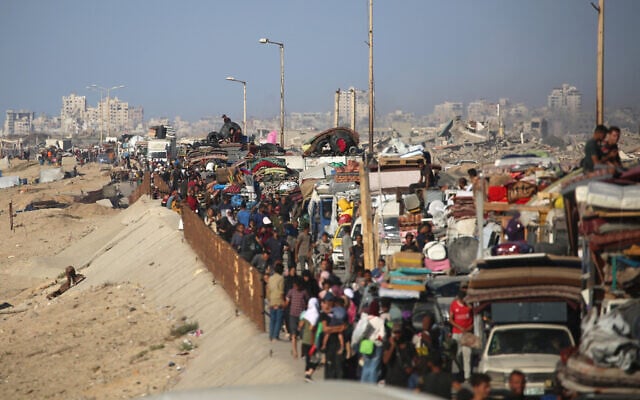 Displaced Palestinians move with their belongings southwards on a road in the Nuseirat refugee camp area in the central Gaza Strip following renewed Israeli evacuation orders for Gaza City on September 16, 2025. (Eyad BABA / AFP)
Displaced Palestinians move with their belongings southwards on a road in the Nuseirat refugee camp area in the central Gaza Strip following renewed Israeli evacuation orders for Gaza City on September 16, 2025. (Eyad BABA / AFP)Other plans presented to the Trump administration by parties with ties to Prime Minister Benjamin Netanyahu’s confidant Strategic Affairs Minister Ron Dermer, or those involved in the establishment of the Gaza Humanitarian Foundation (GHF) and the Boston Consulting Group (BCG), did promote the idea of facilitating or encouraging the “voluntary migration” of Palestinians from Gaza.
But Trump — who first gave legitimacy to the concept of “voluntary migration” in February when he announced his plan to take over Gaza and permanently relocate the Strip’s entire population — has since distanced himself from the idea, and during the August 27 White House policy session made clear that he was going with Blair’s plan instead, the US official said
The US official noted that Finance Minister Bezalel Smotrich is apparently unaware of that decision, having declared on Wednesday that the Gaza Strip is a potential real estate “bonanza” and that he was in talks with Washington on how to carve up the coastal enclave after the war.
The Kushner connection
The August 27 meeting was organized by the US president’s son-in-law Jared Kushner, who served as senior adviser during Trump’s first term and has remained engaged on Middle East issues during his second term, regularly advising US special envoy Steve Witkoff.
Like Kushner in his time, Witkoff has been handed a variety of portfolios. The current special envoy has hired limited support staff, though, and Kushner has been helping with the Gaza day-after planning, as it is increasingly seen as critical for securing a war-ending hostage release deal.
 White House special envoy Steve Witkoff, right, and Jared Kushner wait for the arrival of US President Donald Trump at Teterboro Airport in Teterboro, N.J. on July 13, 2025. (AP Photo/Jacquelyn Martin)
White House special envoy Steve Witkoff, right, and Jared Kushner wait for the arrival of US President Donald Trump at Teterboro Airport in Teterboro, N.J. on July 13, 2025. (AP Photo/Jacquelyn Martin)This spring, Kushner commissioned the Tony Blair Institute for Global Change (TBI) — which was already engaged on the issue thanks to the former UK prime minister’s ties with Israeli, PA and Arab leaders — to come up with a postwar plan, the US official said.
Blair began regular engagement with Trump officials, keeping them abreast of his progress as he met with leaders throughout the region and began ironing out details of his plan, the source familiar with discussions said.
Not enough PA involvement for Ramallah, but too much for Jerusalem
The former UK premier met PA President Mahmoud Abbas in July, thanks to Gulf pressure on Ramallah to engage with the initiative, an Arab diplomat said.
While the PA has expressed its desire to directly oversee the postwar governing body in Gaza and Blair’s plan falls short of that goal, the source familiar with the discussions said Ramallah has “engaged constructively.”
Blair’s proposal envisions the PA undergoing significant reforms and limits Ramallah’s involvement in GITA largely to matters of coordination. Still, the PA is explicitly mentioned throughout the plan, which envisions “the eventual unifying of all the Palestinian territory under the PA.”
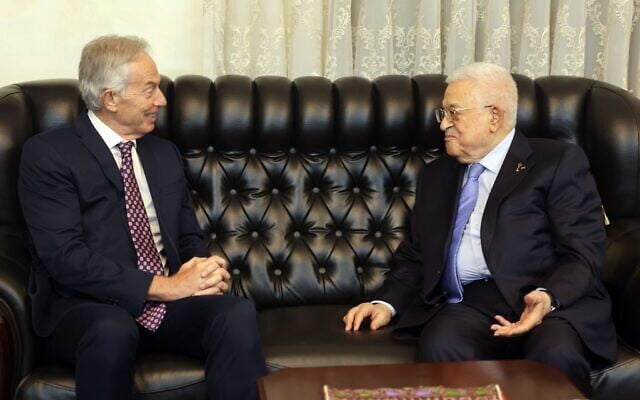 This handout picture released by the Palestinian Authority’s press office (PPO) shows President Mahmoud Abbas (R) meeting with Britain’s former prime minister Tony Blair in Amman, Jordan, on July 13, 2025. (Thaer GHANAIM / PPO / AFP)
This handout picture released by the Palestinian Authority’s press office (PPO) shows President Mahmoud Abbas (R) meeting with Britain’s former prime minister Tony Blair in Amman, Jordan, on July 13, 2025. (Thaer GHANAIM / PPO / AFP)Though that is a development Netanyahu has fought fiercely to prevent, the source familiar with discussions said that Israel has engaged constructively with Blair’s effort.
The Arab diplomat expressed a little more skepticism, however, claiming that Netanyahu has a history of dispatching Dermer to engage on such sensitive matters, then thwarting them before they can materialize in order to keep his coalition, including its far-right flank, intact.
Doha strike derails effort to get ‘Johnny’ on board
Still, Trump was impressed by Blair’s initiative and told him to get “Johnny” on board, the US official said, recalling the moniker Trump used to refer to Saudi Crown Prince Mohammed bin Salman during the August 27 White House meeting.
The US views Saudi Arabia as one of the most critical players when it comes to postwar reconstruction, with enough sway to get the rest of the region on board.
While Trump gave Blair his blessing, he also gave him a two-week window to secure regional support for the plan, the US official said.
That deadline has since expired, but the time period was one the president has announced somewhat regularly without sticking to it.
 US President Donald Trump (right) arrives with Saudi Crown Prince Mohammed bin Salman for the group photo with Gulf Cooperation Council leaders during the GCC Summit in Riyadh, Saudi Arabia, May 14, 2025. (Alex Brandon/AP)
US President Donald Trump (right) arrives with Saudi Crown Prince Mohammed bin Salman for the group photo with Gulf Cooperation Council leaders during the GCC Summit in Riyadh, Saudi Arabia, May 14, 2025. (Alex Brandon/AP)During that period, Blair was also hobbled by the US issuing visa bans against senior PA officials. That decision led to delays in some of the British premier’s meetings with Gulf officials who didn’t want to be seen as endorsing the administration’s decision by immediately meeting with an effective Trump envoy right afterward, the Arab diplomat said.
Still more damaging to Blair’s effort was Israel’s September 9 strike against Hamas leaders in Doha, the source familiar with discussions said.
The former British premier had been engaging Egypt and Qatar about coaxing the terror group not to stand in the way of the plan, the source said, adding that while Blair’s effort was temporarily derailed by the Israeli strike, engagement has since resumed.
‘We don’t have weeks. We have days’
The Doha strike also highlighted what may be one of the main obstacles Blair faces in trying to sell his plan to Israel.
While Netanyahu says the strike was aimed at sending a message to Hamas’s leadership — even those involved in hostage negotiations — conveying that Israel will settle scores with all of them, an apparent goal of Blair’s plan is to neutralize the terror group through nonmilitary means.
Alongside establishing an alternative to Hamas through GITA, the plan also explicitly refers to the concept of “disarmament, demobilization, and reintegration” or DDR.
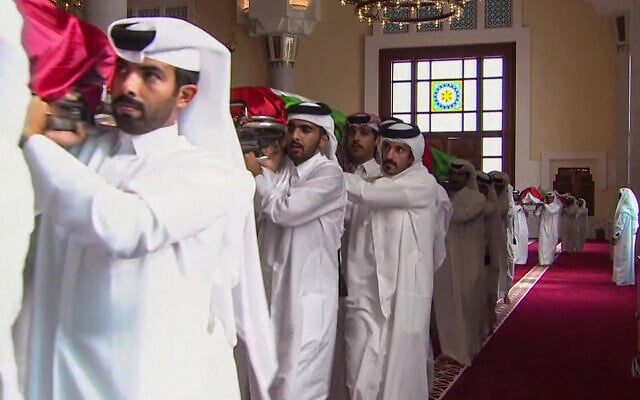 This grab from video footage released by Qatar TV shows men carrying the flag-draped bodies of six people killed in an Israeli strike on Hamas figures two days earlier, inside the Sheikh Mohammed bin Abdul Wahhab Mosque in Doha on September 11, 2025. (QATAR TV / AFP)
This grab from video footage released by Qatar TV shows men carrying the flag-draped bodies of six people killed in an Israeli strike on Hamas figures two days earlier, inside the Sheikh Mohammed bin Abdul Wahhab Mosque in Doha on September 11, 2025. (QATAR TV / AFP)US Secretary of State Marco Rubio may have been referring to that very idea when he said during a press conference with Netanyahu in Jerusalem that “Hamas can no longer continue to exist as an armed element,” as opposed to asserting that the terror group should not exist at all, which has been the Israeli prime minister’s framing.
In the meantime, the Arab diplomat said that Blair also faces an uphill battle getting Riyadh and other regional stakeholders on board, as they are conditioning their support on the plan containing the creation of an irreversible pathway to a future Palestinian state — an idea long abhorred by Netanyahu and his far-right coalition partners.
The aforementioned pathway is one of a list of principles that Arab stakeholders are demanding be folded into any plan they’re being asked to bankroll, the Arab diplomat said.
Still, the source involved in discussions said that Blair has made inroads with regional stakeholders and is racing to advance his plan within a short time frame.
“We don’t have months or weeks. We have days,” the source said.
What’s in the plan
Blair’s proposal envisions GITA being established by a UN Security Council resolution.
GITA will serve as the “supreme political and legal authority for Gaza during the transitional period,” the developed draft of the plan obtained by The Times of Israel states.
GITA will have a board made up of seven to 10 members, which will include “at least one qualified Palestinian representative (potentially from the business or security sector),” a senior UN official, leading international figures with executive or financial experience, and a “strong representation of Muslim members” to boost regional legitimacy and cultural credibility.
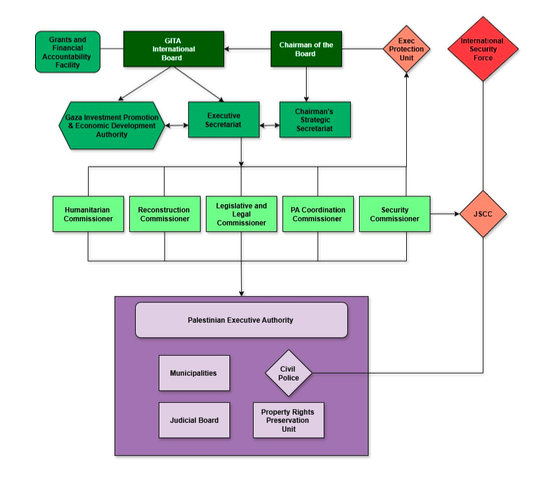 An organizational chart featured in former UK prime minister Tony Blair’s plan to establish a Gaza International Transitional Authority that was obtained by The Times of Israel in September 2025.
An organizational chart featured in former UK prime minister Tony Blair’s plan to establish a Gaza International Transitional Authority that was obtained by The Times of Israel in September 2025.The board will be tasked with “issu[ing] binding decisions, approv[ing] legislation and appointments and provid[ing] strategic direction,” while reporting back to the UN Security Council.
The chair of the board will be appointed by international consensus and receive the endorsement of the UN Security Council. The chair will lead GITA’s external engagement and diplomacy and set the political direction of the body while closely coordinating with the PA, the document says.
The GITA board chair will have a supporting staff of up to 25 people who will serve on the “strategic secretariat.”
The plan also envisions the creation of an Executive Protection Unit “staffed by elite personnel from Arab and international contributors” to protect the GITA leadership.
An “Executive Secretariat” will sit below GITA and serve as the latter’s administrative hub and implementation arm, while directly overseeing the Palestinian Executive Authority (PEA).
The latter body is what has often been referred to as the committee of independent Palestinian technocrats who will be responsible for administering Gaza after the war.
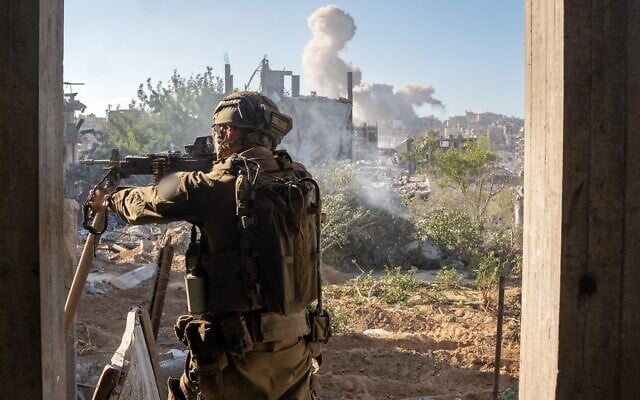 IDF troops operate in Gaza City, in a handout photo issued on September 17, 2025. (Israel Defense Forces)
IDF troops operate in Gaza City, in a handout photo issued on September 17, 2025. (Israel Defense Forces)PA coordination
Reporting to the Executive Secretariat will be a group of five commissioners who will supervise key areas of Gaza governance: humanitarian affairs, reconstruction, legislation and legal affairs, security, and PA coordination.
Notably, the plan states that the commissioner overseeing humanitarian affairs will be responsible for coordinating with humanitarian agencies, including the Gaza Humanitarian Foundation, which some Arab stakeholders have been demanding be dismantled.
As for the PA coordination commissioner, the plan envisions the aim of their office being to “ensure that the decisions of GITA and those of the PA are, so far as possible, aligned and consistent with the eventual unifying of all the Palestinian territory under the PA.”
The commissioner will also “track PA reform efforts in coordination with international donors, financial institutions and Arab partners engaged in Palestinian institutional development.”
The source involved in the discussions stressed that the reforms that the Blair plan expects of the PA “are not cosmetic,” and that part of the reason there’s not a set timeline for GITA to hand over authority of Gaza to the PA is that the process is “performance-based.”
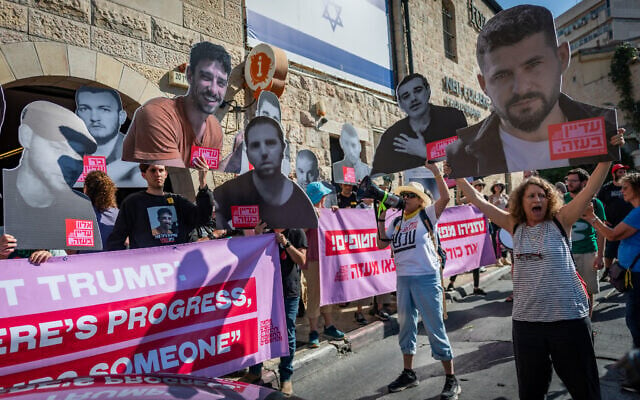 Demonstrators protest against Gaza City operation outside the Jerusalem Post conference in Jerusalem, call for the release of hostages held in the Gaza Strip, September 16, 2025. (Yonatan Sindel/Flash90)
Demonstrators protest against Gaza City operation outside the Jerusalem Post conference in Jerusalem, call for the release of hostages held in the Gaza Strip, September 16, 2025. (Yonatan Sindel/Flash90)Still, the source clarified that the timeline will be several years, “not ten.”
The plan envisions the establishment of the Gaza Investment Promotion and Economic Development Authority to secure investments for GITA and Gaza’s reconstruction. It will be a “commercially driven authority, led by business professionals and tasked with generating investable projects with real financial returns.”
A separate body will be established to secure and distribute government grants.
Also reporting to GITA and its Executive Secretariat will be the Palestinian Executive Authority, which will interface more directly with Palestinians by delivering services “through a nonpartisan, professional administration.”
The PEA will be headed by a CEO formally appointed by the GITA board and will be responsible for overseeing a series of technocratic ministries, including health, education, finance, infrastructure, judicial affairs and welfare.
Also reporting to the PEA will be Gaza municipalities, which will be responsible for delivering services at the local level; a Gaza civil police force of “nationally recruited, professionally vetted, and nonpartisan” officers tasked with maintaining public order and protecting civilians; a judicial board chaired by an Arab jurist who will supervise Gaza’s courts and public prosecution office; and the aforementioned “Property Rights Preservation Unit.”
Preventing Hamas’s resurgence
Backing the civil police force will be the “International Stabilization Force (ISF) — an internationally mandated, multinational security force established to provide strategic stability and operational protection in Gaza during the transitional period.”
“It ensures border integrity, deters armed group resurgence, protects humanitarian and reconstruction operations, and supports local law enforcement through coordination — not substitution,” the plan states.
 US President Donald Trump hosts families of hostages held by Hamas in Gaza, at the White House on September 10, 2025. (Hostages Families Forum)
US President Donald Trump hosts families of hostages held by Hamas in Gaza, at the White House on September 10, 2025. (Hostages Families Forum)In an apparent reference to its task of combating remnants of Hamas, the plan says the ISF will “conduct targeted operations to prevent the resurgence of armed groups, disrupt weapons smuggling and neutralize asymmetric threats to public order and institutional functions.”
In an annex on GITA’s costs, the plan explains that the budget will expand each year as the new governing body gradually phases into operations throughout the entire Strip.
The first year’s budget is placed at $90 million, the second year at $135 million and the third year at $164 million. The figures don’t include the costs of the ISF and humanitarian aid, though, and the source familiar with the discussions said the estimates were conservative.
How to end the war
While Blair’s isn’t the only plan for the postwar management of Gaza, it appears to be the lone proposal that has secured US backing. Still, the source involved in the discussions acknowledged that it can’t be considered a US plan until Trump publicly says so.
The document has also gone through a few rounds of edits since it was obtained by The Times of Israel, as Blair continues to receive feedback from stakeholders, the source said.
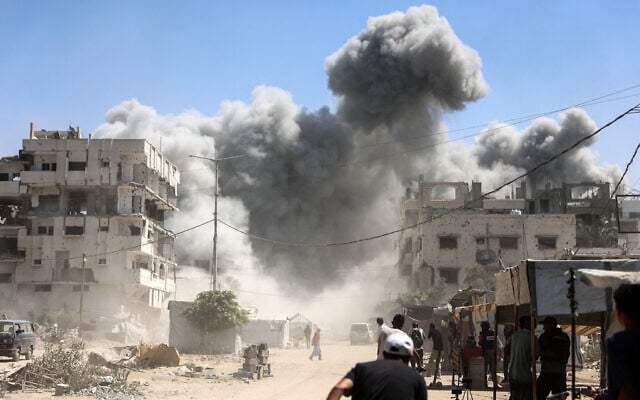 The Mhanna tower collapses amid heavy smoke, after an Israeli strike following an evacuation order in the Tal el-Hawa neighborhood of Gaza City on September 14, 2025 (Omar AL-QATTAA / AFP)
The Mhanna tower collapses amid heavy smoke, after an Israeli strike following an evacuation order in the Tal el-Hawa neighborhood of Gaza City on September 14, 2025 (Omar AL-QATTAA / AFP)“The way to end the war is to [get regional stakeholders to] agree on principles for how Gaza will be governed afterward in a manner that Hamas is not involved and not armed and unable to regain power,” the source said.
“This can only happen if there is a new governing structure in Gaza with a serious security force from the international community. This cannot be the PA in the beginning. The PA will be a partner. They’ll be consulted and coordinated with, but they won’t be the ones managing Gaza on day one. This will happen later on after they reform,” the source added. link
Spain says it will probe ‘rights violations in Gaza’ to assist International Criminal Court
Spain will probe “human rights violations in Gaza” to assist the International Criminal Court, which has sought arrest warrants for Israeli leaders over alleged war crimes, the country’s attorney general says.
A statement says the attorney general has “issued a decree to create a working team tasked with investigating violations of international human rights law in Gaza” to “gather evidence and make it available to the competent body, thereby fulfilling Spain’s obligations regarding international cooperation and human rights.”
Personal Stories
Acronyms and Glossary
ICC - International Criminal Court in the Hague
IJC - International Court of Justice in the Hague
MDA - Magen David Adom - Israel Ambulance Corp
PA - Palestinian Authority - President Mahmud Abbas, aka Abu Mazen
PMO- Prime Minister's Office
UAV - Unmanned Aerial vehicle, Drone. Could be used for surveillance and reconnaissance, or be weaponized with missiles or contain explosives for 'suicide' explosion mission
Join my Whatsapp update group https://chat.whatsapp.com/IQ3OtwE6ydxBeBAxWNziB0
Twitter - @LonnyB58 Bluesky - @lonny-b.bsky.social
My blogs in The Times of Israel my blogs
Substack - https://lonnyb.substack.com/
Twitter - @LonnyB58
My blogs in The Times of Israel my blogs
Substack - https://lonnyb.substack.com/




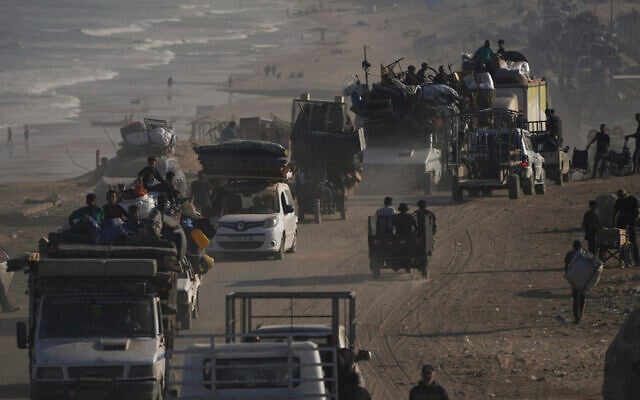
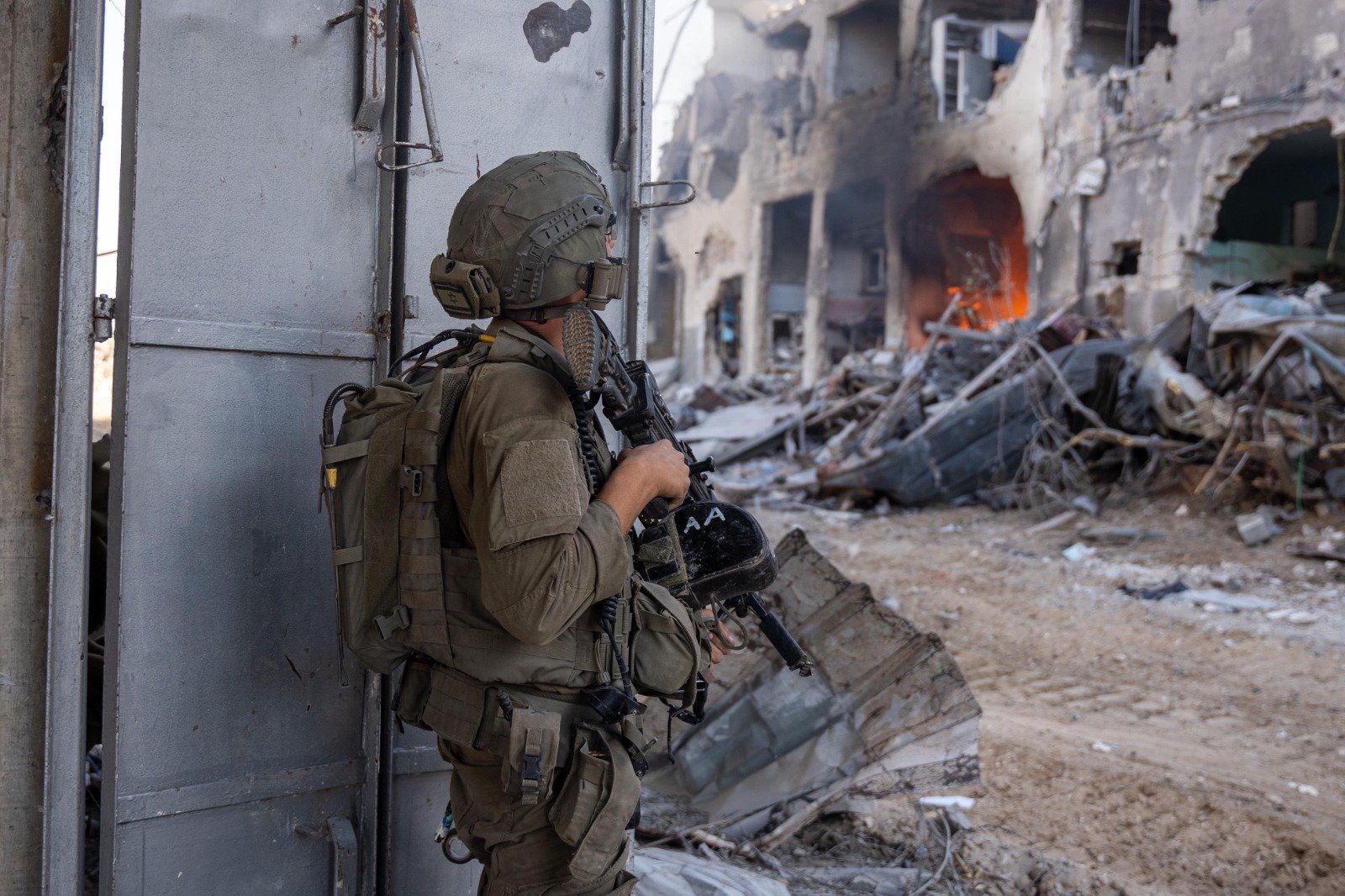
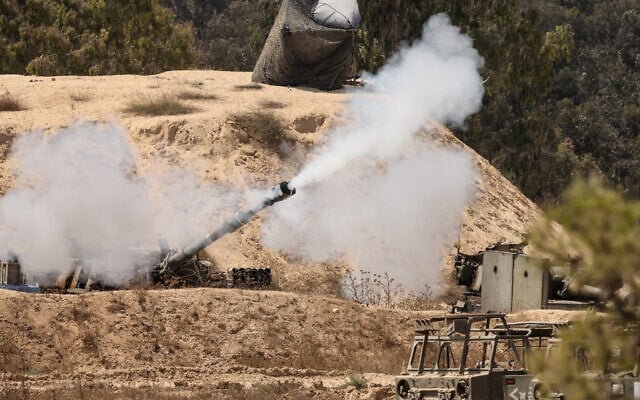





Comments
Post a Comment